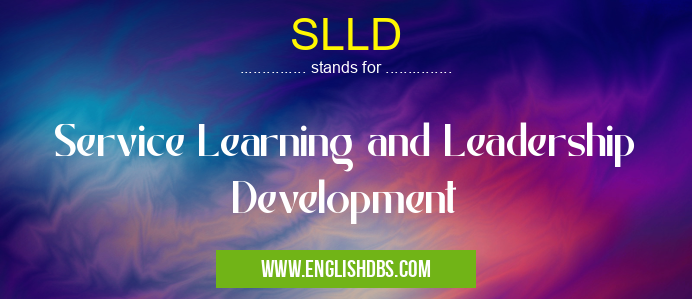What does SLLD mean in DEVELOPMENT
Service Learning and Leadership Development (SLLD) is an approach to learning that combines academic instruction with service projects. This type of education encourages students to apply what they learn in class to a practical setting, while developing their leadership skills. The goal of SLLD is for students to become engaged citizens who are knowledgeable about their communities, confident in their ability to make a difference, and passionate about making the world a better place. Through SLLD, students can acquire important lifelong skills while providing valuable contributions to their community.

SLLD meaning in Development in Community
SLLD mostly used in an acronym Development in Category Community that means Service Learning and Leadership Development
Shorthand: SLLD,
Full Form: Service Learning and Leadership Development
For more information of "Service Learning and Leadership Development", see the section below.
» Community » Development
Meaning
Service Learning and Leadership Development (SLLD) is an educational approach focused on service within communities. It bridges the gap between theoretical knowledge and real-world application by drawing on both academic content and practical experience. Students complete projects related to areas such as health, environment, hunger, minority issues, or poverty as part of the learning process. Through these activities, students develop leadership skills such as collaboration, problem solving, communication and empathy; gain an understanding of societal issues; increase awareness of community resources; and increase civic engagement by becoming active members in their local community.
Benefits
The benefits of Service Learning and Leadership Development (SLLD) extend beyond just academic performance; it also promotes social-emotional development in young people. By participating in meaningful projects in their communities or around the world, students build self-confidence and learn the importance of being civically engaged. They also develop strong communication skills essential for working with others—including strangers from diverse backgrounds—in order to reach shared goals. These experiences provide them with first-hand knowledge of different cultures they may not otherwise encounter. Furthermore, SLLD helps bridge the gap between traditional academics and real-world experience which opens doors for further education or employment opportunities.
Essential Questions and Answers on Service Learning and Leadership Development in "COMMUNITY»DEVELOPMENT"
What is Service Learning and Leadership Development?
Service Learning and Leadership Development (SLLD) is an educational program that promotes learning through academic study as well as practical service projects. It combines elements of service, leadership, professional development, and critical thinking to engage students in meaningful activities within their communities. Through SLLD, students develop personal and social responsibility while gaining essential real-world experience.
Who can participate in SLLD?
SLLD is designed for any high school student looking to expand their knowledge outside the classroom while serving their community. The program also seeks to provide opportunities for students from diverse backgrounds and those who may not have access to traditional extracurricular activities.
What kind of activities do participants undertake during SLLD?
During SLLD, participants work on a variety of civic engagement projects that focus on direct local need or global justice initiatives. They are encouraged to think critically about complex issues related to their projects in order to better understand their roles in society. Participants also learn more about professional development strategies such as communication skills, time management, public speaking, and networking.
How long does SLLD last?
The length of each program varies depending on the organization or institution hosting it. Generally speaking, most programs involve several months of intensive study and service work over the course of one year or more.
What type of commitment do participants need to make when participating in SLLD?
All participants should be prepared to commit sufficient time for both academic studies and volunteer hours associated with their project(s). This includes attending classes/workshops as well as devoting hours outside of class for completing tasks related to the project(s). Students must also be willing to take on leadership roles within their group or team if needed.
Does participation in an SLLD program require an application process?
Yes – interested participants must complete an application form before being accepted into an SLLD program. Applications typically request basic biographical information as well as educational background and prior volunteer experience (if applicable). Some programs may also require additional documents such as letters of recommendation or essays demonstrating motivation for involvement with the program. It is important that all questions are answered carefully and all information is provided accurately so applications can be assessed properly by selection committees.
Is there a cost associated with enrollment in an SLLD program?
The cost associated with enrollment will vary depending on each particular organization or institution hosting the program; however, this cost will typically include tuition fees (if applicable), materials & supplies needed for completion of service learning projects, travel expenses (if required), etc., depending upon what services are being offered under the program itself. Financial aid may be available at certain institutions; please contact the host organization directly for more information regarding fees/costs associated with enrollment.
Final Words:
In conclusion, Service Learning and Leadership Development (SLLD) provides many benefits for learners including increased academic performance; enhanced interpersonal skills; and enhanced knowledge of societal issues through direct experiences working in the community. By leading service projects and working collaboratively with peers from diverse backgrounds among other activities within this framework, young people are equipped not only with important subject matter but also life long college readiness tools like communication abilities essential for success after high school graduation. In summary, SLLD gives students valuable relevant learning experiences which equip them with necessary personal growth attributes needed for success in today’s dynamic global society.
